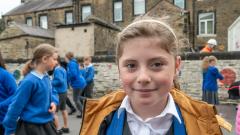Relationships and Sex Education (RSE) Statement
At Christ Church School we want all children to be healthy, happy and safe as they grow through life. It is important that they gain the skills and knowledge to manage the challenges of modern life and to make informed decisions about their health, wellbeing and relationships as they begin to mature and become more independent.
Relationships Education at Christ Church School
Relationships education in our school is about teaching the fundamental building blocks and characteristics of positive relationships, with particular reference to friendships, family relationships and relationships with other peers and adults.
At Christ Church School children begin to learn about healthy relationships from the very start, for example recognising who cares for us and supports us, understanding what we mean by family and how to be a good friend, as well as learning how to spot the signs of less healthy relationships and building skills to manage these.
Children are taught to share, take turns and to treat each other with kindness, consideration and respect. They learn about how to manage difficulties such as differences of opinions or responding to peer pressure, including on and offline.
We recognise that families at Christ Church school take many forms and understand that teaching about families must be sensitive and well-judged to ensure that there is no stigmatisation of children based on their home circumstances and needs.
Safeguarding is at the heart of this policy; we teach about the forerunners to consent, such as establishing personal boundaries, including mental and physical boundaries and appropriate, inappropriate or unsafe contact both online and in person.
The teaching of relationships education is important. It helps children to build essential skills that they need in order to build respectful, loving and non-exploitative relationships and supports their decision-making skills in order to keep themselves mentally and physically safe both on and offline.
Relationships education takes place in PSHE lessons from Reception through to Year 6 and is enhanced by our church school values of friendship, koinonia and wisdom which underpin everything we do. Relationships education is statutory in primary schools.
Sex Education at Christ Church School
The National Curriculum for science includes age-appropriate subject content in related areas such as the main external body parts, the human body as it grows from birth to old age (including puberty) and life cycles and reproduction in some plants and animals. Information about our science curriculum can be found on the school website.
As children grow and develop they experience many physical and emotional changes. It is important that they are prepared for this and understand that these changes are a normal part of growing up. We use the HSE Busy Bodies materials and videos to support our teaching of puberty which is tailored to the age and physical maturity of children.
Sex Education beyond the national curriculum for science is not compulsory in primary schools, however it is important that the transition phase before moving to secondary school supports pupils’ ongoing emotional and physical development effectively. Schools may determine whether they need to cover any additional content to meet the needs of their pupils.
We, like many other schools already choose to teach some aspects of sex education and will continue to do so. These supplementary lessons, are solely for children in Year 6 and are delivered through the HSE Busy Bodies materials: How are babies made? Parents and carers are always invited to view the materials prior to the lessons starting and their consent is obtained.
We recognise that for some parents and carers, the idea of children receiving sex education in primary school may seem too early. However, we know that it is common for primary-aged children to have questions pertaining to sex or sexuality which go beyond what is set out in the Science or PSHE curriculum. We know that when children’s questions go unanswered they may turn to inappropriate sources of information such as the internet, mis-informed peers, or people who may not have their best interests at heart. It is important that children have accurate information and feel able to talk about what they may deem ‘difficult’ topics to adults they can trust in order to keep themselves safe.
We also know that quality RSE lessons help to safeguard children. Research published on sexeducationforum.org.uk shows that children who have had high quality RSE lessons are more likely to report abuse and to delay having sex until they are ready.
We would encourage any parents or carers that are concerned about this to contact school to discuss their particular concerns.

